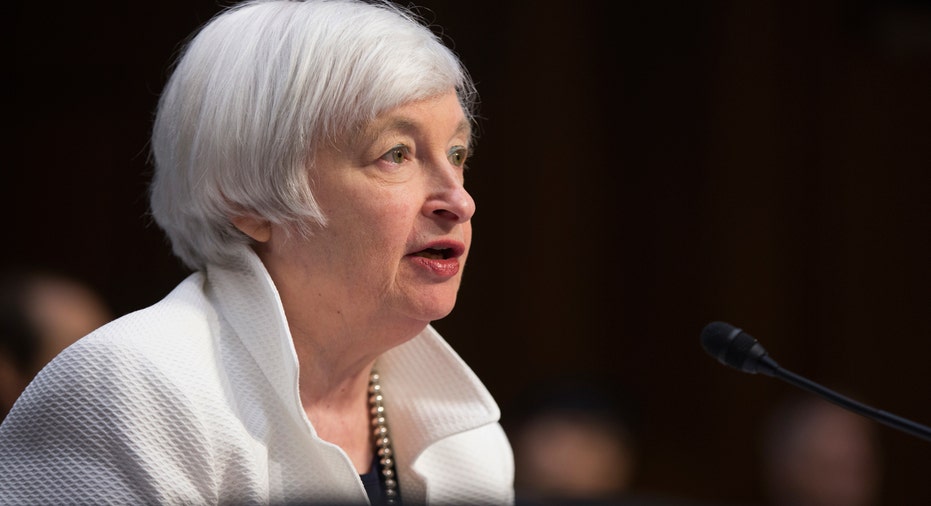Yellen Reiterates Fed's 'Cautious' Approach to Rate Hikes

Federal Reserve Chief Janet Yellen on Tuesday said the central bank will continue its “cautious” approach to raising short-term interest rates, allowing economic data to guide the decision-making process.
Yellen’s comments came during prepared remarks in front of the Senate Banking Committee during her semi-annual monetary policy update to Congress. She will head to the House Financial Services Committee on Wednesday.
Reiterating comments made during her press conference following last week’s two-day Federal Open Market Committee meeting, Yellen explained central bankers are looking for economic growth to return to a “moderate” pace, further strength in the labor market after the unexpectedly weak May jobs report and inflation that continues to move toward the 2% objective.
Yellen cited a range of issues weighing on the economy including subdued foreign growth, the strong U.S. dollar that continues to weigh on corporate earnings, an energy sector hit hard by nearly two years of ultra-low oil prices, and weak business investment. Still, she noted some signs of strength, including a “noticeable step-up” in gross domestic product in the second quarter after a weak first quarter, and anticipation for improving jobs growth in the coming years.
“In particular, consumer spending has picked up smartly in recent months, supported by solid growth in real disposable income, and the ongoing effects of the increases in household wealth,” she said. “And housing has continued to recover gradually, aided by income gains and the very low level of mortgage rates.”
"A U.K. vote to exit the European Union could have significant economic repercussions."
Bryce Doty, senior fixed income manager at Sit Investment Associates, said an important point to note is Yellen’s suggestion during the question-and-answer period not to over-emphasize one weak employment report.
“She stated that other indicators show that the labor market is still doing well. So, perhaps the Fed isn’t as dead as the market thinks,” he said. “Overall, a much more upbeat tone from Yellen: She used the word ‘optimism’ more and ‘uncertainty’ less.”
While the U.S. economy is central to the Fed’s decision on raising rates, looming in the background is Thursday’s U.K. vote on whether it will sever ties with the European Union. The referendum has put global markets on edge as investors have seen a spike in volatility as markets across the world have seesawed between extreme gains and losses. In its policy decision last Wednesday, the FOMC cited the so-called Brexit vote as one of the factors in its decision to hold off on raising rates at the June meeting.
Again, Yellen reiterated the uncertainty about how unprecedented global events could impact continued U.S. economic recovery.
“One development that would shift investor sentiment is the upcoming referendum in the United Kingdom. A U.K. vote to exit the European Union could have significant economic repercussions,” she warned.
Yellen added should Brexit happen, the move to unwind the U.K. from the bloc would usher in a period of uncertainty and market volatility that would negatively impact financial conditions and the uncertain U.S. economic outlook. Still, she said risks are “quite low” that the U.S. economy would enter a recession by the end of the year and a Brexit-induced recession is not the most likely outcome.
Also on the Fed’s external-risk radar are concerns about the slow-growth environment in China as it continues to work to shift its economy toward domestic demand and consumption and away from export-led growth.
“More generally, in the current environment of sluggish growth, low inflation, and already very accommodative monetary policy in many advanced economies, investor perceptions of and appetite for risk can change abruptly,” she said.
In her opening remarks, Yellen offered no forecast for the timing of future rate hikes in the U.S., though fed funds futures, a tool used to predict market expectations of changes in monetary policy, show just a 14% chance of a rate rise next month and a 54% chance for at least one increase by December.
IG market analyst Joshua Mahony remarked that a raft of shifting opinions among Fed officials, including a dovish shift from St. Louis Fed president James Bullard, shows central bankers are at odds about when the economic recovery will warrant higher rates.
“Certainly there will be significant fears surrounding Brexit and how long this Chinese downturn will last, yet there is also a feeling that the U.S. economy is not in as rude health as previously thought, raising major doubts over a 2016 hike,” he said.



















